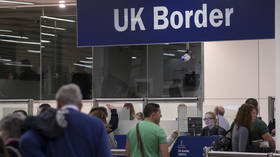Hotly-touted Oxford coronavirus VACCINE trial has only 50 percent chance of success, project leader warns
The professor leading Oxford University’s highly-anticipated coronavirus vaccine trial has poured cold water on much of the hype surrounding the project by warning that it has only a 50 percent chance of being successful.
In an interview in the Telegraph on Sunday, Professor Adrian Hill, director of Oxford’s Jenner Institute, said that the upcoming trial, involving 10,000 volunteers, threatens to return “no result” due to low transmission of Covid-19 in the community.
While the low incidence of the virus among the public is undoubtedly positive news, it leaves vaccine-makers with a major problem, as without Covid-19 circulating volunteers will not catch the illness and scientists won’t be able to prove that their vaccine works.
“It’s a race against the virus disappearing, and against time,” the expert told the British newspaper.
At the moment, there’s a 50 percent chance that we get no result at all.
Oxford University has teamed up with drugmaker AstraZeneca Plc to develop the experimental vaccine, known as ChAdOx1 nCoV-19, which is one of the leading candidates in the global race for protection against the coronavirus responsible for the Covid-19 pandemic.
The Oxford team had a significant lead on other potential inoculations as it already had a vaccine tested against an earlier coronavirus, which did not cause any harm to humans. It began early-stage human trials in April and is one of only a handful of potential vaccines around the world to reach the crucial milestone.
The work of developing vaccines usually takes years, if not decades, to come to fruition. However, research on a Covid-19 dose is happening at breakneck speed and scientists hope to cram years of work into mere months.
Early-stage trials of a vaccine developed in China show that it appears to be safe and protects people from the virus, according to research published in the Lancet on Friday. The trial was carried out by researchers at several laboratories and included 108 participants aged 18 to 60. The participants received a single dose of the vaccine and the antibodies needed for immunity peaked 28 days after the inoculation.
Also on rt.com Russian scientists hope to begin HUMAN TESTING on Covid-19 vaccine within weeks, having tried it on themselves firstA US company also announced positive developments in recent days, reporting earlier this week that its vaccine can train people’s immune systems to combat Covid-19. Moderna said the first eight patients in its human trial all produced antibodies that could neutralize the virus.
In Russia, a team from the Moscow-based National Research Center for Epidemiology and Microbiology say they’re hopefully just weeks away from starting human trials after testing their vaccine on their own bodies.
Results of just one other human trial have been published in a scientific journal. The manufacturer, Sinovac Biotech, said on Friday that the vaccine has now entered mid-stage human trials.
Like this story? Share it with a friend!














